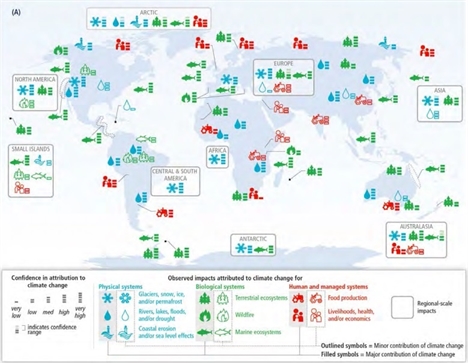31.03.14
‘Urgent action’ required on climate change
Today’s IPCC report on the potential impacts of climate change – the most serious and alarming so far – shows the need for the UK to “take a lead” on tackling the crisis, says energy secretary Ed Day.
The IPCC’s Working Group II report has shown that climate change in Europe could lead to increased more floods, droughts and heatwaves, with associated economic losses, health impacts, productivity dips and air quality issues. Globally, the effects on ecosystems, agriculture and livelihoods, especially in coastal areas, are likely to be much worse.
Although the study did not focus on individual countries, its findings aligned with the UK’s own Climate Change Risk Assessment (CCRA) published in 2012, which identified that the biggest challenges in the UK will be flooding and water shortage.
The IPCC added “as sea levels rise, coastal communities worldwide will experience ever more flooding, coastal erosion and submergence. Species face extinction and the ocean is warming and acidifying”.
It also stated that “urgent action” to reduce emissions is essential to avoid dangerous climate change. However, the level of “adaptation” required is dependent on the scale of mitigation, but there are limits to what adaptation alone can achieve.
An example of an adaptation strategy would be the construction of sea walls and levees to protect against flooding. Another might be introducing more efficient irrigation for farmers in areas where water is scarce.
Vicente Barros, co-chair of Working Group II, said: “We live in an era of man-made climate change. In many cases, we are not prepared for the climate-related risks that we already face. Investments in better preparation can pay dividends both for the present and for the future.”
Energy and climate changesecretary Ed Davey MP said: “Science has clearly spoken.”
He added that, if left unchecked, climate change will impact on many aspects of the UK’s society, with far reaching consequences to human health, global food security and economic development.
“The UK is leading from the front and working with our European partners. We’ve adopted some of the most ambitious climate change targets in the world. We are investing in low carbon and energy efficiency technologies, with an increased focus on home-grown renewables, to reduce our reliance of foreign imports and create a sustainable supply of affordable energy for consumers and businesses alike,” added Davey. “We are also pushing for an ambitious EU energy and climate change package that will lead to a 40% reduction in greenhouse gas emissions by 2030 and will take us on the next step to tackling climate change.”
John Deben, who chairs the Statutory Committee on Climate Change advising the government, tweeted: “What scientists thought overwhelmingly likely, the evidence now confirms. Irrational to ignore.”
Professor Richard Betts, head of impacts at the Met Office and one of the Met Office's lead authors on the WGII report, said: “This report draws together multiple strands of evidence to show that climate change is already having a global impact, particularly on the natural world, and that it will have bigger impacts in the future.”
Lord Stern, whose 2006 report on the economics of climate change had a big impact on policy-makers, said: “This report presents a stark case for sharply reducing emissions of greenhouse gases to avoid potentially catastrophic impacts, such as the irreversible melting of the Greenland ice sheet and the resultant rise in sea level, to which we will not be able to make ourselves fully resilient and which lie outside the evolutionary experience of modern Homo sapiens.”
A total of 309 coordinating lead authors, lead authors, and review editors, representing 70 countries, were selected to produce the Working Group II report. They enlisted the help of 436 contributing authors, and a total of 1729 expert and government reviewers provided comments on drafts of the report.

Tell us what you think – have your say below or email [email protected]